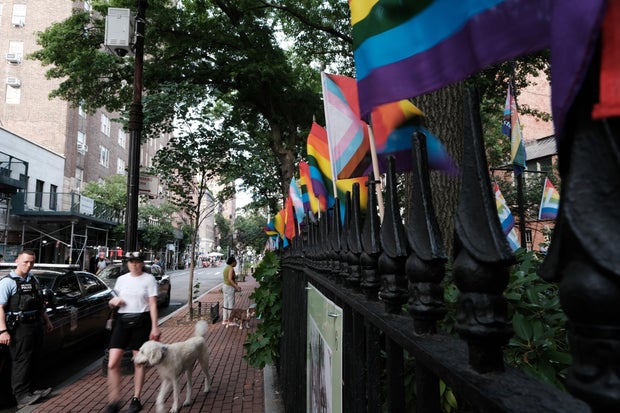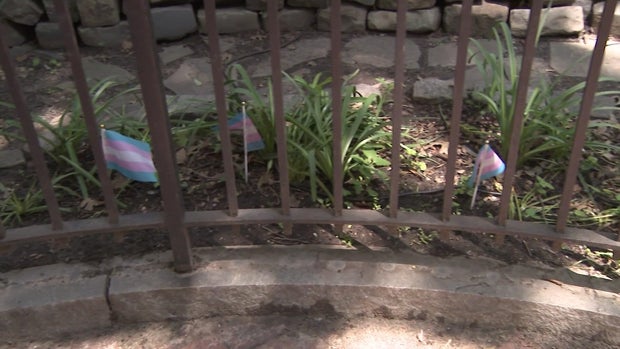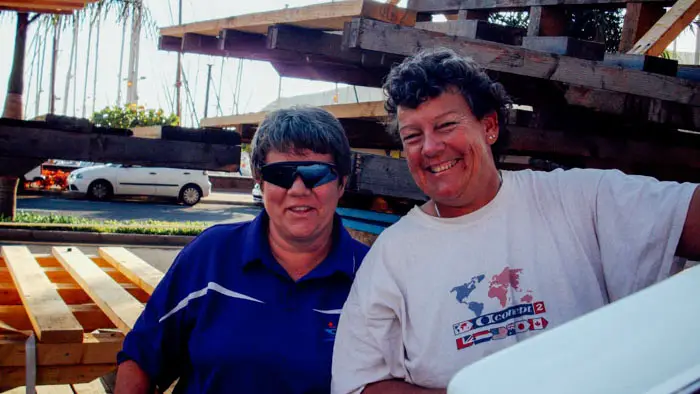Meet the Conservative Think Tank Leading America’s Anti-DEI Movement
Over the past five years, corporate America has abandoned diversity, equity and inclusion (DEI) practices en masse, with the crusade to roll back these efforts only ramping up since Trump’s reelection.
A key factor fueling these rollbacks is shareholder proposals.
Over the last year, Apple, Alphabet, Netflix, JPMorganChase, PayPal, Costco, Goldman Sachs, Berkshire Hathaway, Walmart, Kroger and Coca-Cola have all received proposals to review or report on DEI policies, cut connections with LGBTQ advocacy organizations or cease DEI efforts altogether.
While it may seem like there are many forces behind these proposals, they were all submitted by the National Center for Public Policy Research, a conservative think tank commonly referred to as the National Center.
Although not very well known, they are effective: Since receiving their proposals, half of the companies listed above have watered down or abandoned their DEI practices, with Apple, JPMorganChase, Costco, Kroger and Coca-Cola standing firm.
And although the National Center has been trying to dismantle DEI for nearly two decades, they’re experiencing enormous success today due to the rise of the conservative crusade against “woke capitalism” and so-called “viewpoint discrimination.”
Jason Stahl, a historian and researcher specializing in right-wing think tanks and populism in the U.S., says the National Center’s newfound success reflects a renewed desire for socially conservative populist movements. “Think tanks prime themselves to respond to the American political culture in a populist way and to present themselves as for the people.”
“We’ve got Flint, Michigan without clean drinking water, we’ve got the flooding that occurred in Appalachia and North Carolina, we’ve got the fires in California and in Hawaii. Why aren’t we talking about all this?” he says. “Politics should be about the improvement of people’s lives,” but dominant powers in the U.S., including the National Center, want people to be fighting over DEI—a debate that detracts “from the material reality of people’s lives.”
How the National Center Is so Effective
Through shareholder proposals, the National Center—along with anyone who owns a high enough stake in a publicly traded company—can attempt to influence its governance.
In their proposal to Apple, the National Center submitted a “Request to Cease DEI Efforts,” writing, “Apple likely has over 50,000 [employees] who are potentially victims of this type of discrimination.” In their proposal to Alphabet, Google’s parent company, they came after the Human Rights Campaign’s (HRC) Corporate Equality Index (CEI), calling it “hyper-partisan, divisive and increasingly radical.” Their supporting statement included disinformation about transgender people, claiming the HRC uses the CEI “to force [corporations] to do the political bidding of radical activists, which seek to sow gender confusion in youth, encourage permanent surgical procedures on confused and vulnerable teens, and effectively eliminate girls’ and women’s sports and bathrooms.”
And in their proposal to Goldman Sachs, they requested a “Racial Discrimination Audit,” citing a Supreme Court case that alleged Harvard University’s affirmative action policies discriminated against white students.
While the Goldman proposal failed, with just 2% of shares voting in its favor, the company still dropped their diversity and inclusion policies. But even these losses are often considered wins by the National Center, who have said that “the true aim of these proposals is to negotiate with companies and convince them to amend their equal employment opportunity policies to add protections against viewpoint discrimination.”
Subscribe for LGBTQ-focused journalism.
R.G. Cravens, a senior research analyst at the Southern Poverty Law Center, says the anti-DEI movement is part of a bigger campaign to maintain the status quo in corporate America. “A lot of the rhetoric the hard right uses to describe DEI is based on racist and white supremacist narratives about people of color. For example, saying that DEI means unqualified people get jobs, they mean people of color who aren’t qualified to hold positions,” he says. “DEI policies are designed to interrupt systemic inequalities, and they do a lot beyond just what the hard right tends to caricature them as doing.”
In principle, DEI is meant to close wage and opportunity gaps in the workforce. LGBTQ workers earn 90 cents to every dollar earned by the average American worker, and women make 85 cents to every dollar earned by men. Meanwhile, Black and Latino workers make 24% and 28% less than white workers, respectively. Trans women, who are the most demonized in the crusade against DEI, earn just 60 cents on the dollar compared to the typical American worker.
Mary Wrenn, a professor of economics specializing in capitalism and neoliberalism at the University of Cambridge, says the crusade against DEI uses a similar strategy to that used against the civil rights movement of the 1960s. “There were a lot of economists and politicians who said that we should not force desegregation because the free market will take care of it. Of course that’s not true: We had to have legislation in order for the cultural and social spheres to catch up.”
The National Center’s Free Enterprise Project and the Rise of Stefan Padfield
While the anti-DEI movement has only gained momentum in the last few years, the National Center has been around since 1982, when Amy Moritz Ridenour, a former campaign coordinator for Ronald Reagan, founded it.
In the 1990s, they successfully campaigned against the Clinton healthcare plan that would have provided universal healthcare to all Americans. Throughout the early 2000s, they campaigned to limit the amount that businesses which knowingly sold deadly asbestos products must pay in compensation to victims.
One of the National Center’s major initiatives is the Free Enterprise Project (FEP). Launched in 2007, they claim the FEP is “the original and premier opponent of the woke takeover of American corporate life and defender of true capitalism.”
Through the years, the FEP has campaigned against attacks on conservatives, pharmaceutical company support for the Affordable Care Act, and government initiatives to cap corporate carbon dioxide emissions.
But in recent years, the FEP’s focus has been to use shareholder activism to force a shift in corporate America. In 2021, they launched the Stop Corporate Tyranny coalition, which aims to “[expose] the Left’s nearly completed takeover of corporate America” and provide “resources and tools for everyday Americans to fight back against the Left’s woke and censoring mob in the corporate [world].”
The National Center’s funders include anti-LGBTQ hate groups like the Alliance Defending Freedom; religious donor-advised funds like National Christian Foundation; mainstream charitable funds like Fidelity, Schwab and Vanguard Charitable; and corporations such as ExxonMobil.
Subscribe for accountability journalism.
“Free enterprise is just a mask for social conservatism because they want small government, but only with respect to business—they don’t want it with respect to people’s lives,” Wrenn told Uncloseted Media. “It’s about controlling the cultural conversation and our social norms, and that’s very tied up with white supremacy, patriarchy and capitalism as an economic means by which to forward their personal agendas,” says Wrenn.
Stahl says President Trump’s positioning as a right-wing populist plays well into the National Center’s strategy. “They’re populist projects that say the liberals are out of touch and against your values. Over the decades, the messaging is the same but different issues get plugged in and we’re seeing this really come to its full flowering because [of] Trump,” he told Uncloseted Media.
In 2023, Stefan Padfield joined the FEP, quickly becoming the deputy director. The following year, the project convinced the U.S. Court of Appeals to overturn a Nasdaq board diversity rule that had required any Nasdaq-listed companies have—or explain why they don’t have—at least two “diverse” directors, including at least one woman and at least one other person who identifies as an underrepresented minority.
Padfield regularly posts transphobic quotes on X. In November, shortly after Trump won the election, he tweeted: “The trans insanity, the DEI indoctrination, the gender mutilations of kids—the moms looked at all that and said ‘hell no!’ at the polls.”
Padfield has also penned articles for RealClearMarkets, such as “A Question for Goldman Sachs: What Is a Woman?” in which he claims, “Transgenderism is one of the most divisive issues today,” reducing trans women to men who “become [women] simply by saying so.”
In an email to Uncloseted Media, Padfield says he has “no disdain for trans people or the wider LGBTQ community.” He says he wants to see all people have equal opportunities for maximum flourishing. “Having said that, if someone claims, for example, that they need to be permitted to surgically mutilate minors behind the backs of their parents in order to feel affirmed in their belief that children can be born in the wrong body, then I will be on the side of those defending those children.¹”
The Belief That America Should Be Governed as a Christian Theocracy
The National Center’s mission is reflective of a larger network of conservatives who claim to be protecting so-called viewpoint diversity. Last year, they launched an app to help shareholders identify conservative proposals that would help “hold woke corporations accountable.” The app also provided users with “neutrality v. wokeness” ratings of certain companies.
Cravens says that “viewpoint discrimination” has replaced “political correctness” as conservative buzzwords. “It’s this innocuous-sounding phrase like ‘We need to protect First Amendment speech and maintain pluralism’ … [this false notion] that conservatives and people who oppose anti-racist policies and LGBTQ-inclusive policies are discriminated against. But that is so reductionist because it ignores how white people have claimed and maintained power against communities of color through wealth inequality, racist corporate policies and banking practices,” he says.
He says there’s a rhetorical connection shared across these groups that Christian supremacists have been using for decades. “You say you’re concerned about children and trying to strengthen the family—that’s a totally different kind of marketing than ‘We are evangelicals and we’re here to take over.’ It’s been described as a stealth communication strategy to articulate the same message in secular terms in an effort to reach all Americans.”
What This Means for LGBTQ People
The National Center’s successes have a very real impact on LGBTQ communities. “I think they risk losing their jobs ultimately,” says Cravens. “One of the goals is to drive queer people back into a closet and dismantle any notion that it’s okay to be [openly] queer. They want to turn a group of people toxic so they won’t get service, they won’t get jobs and they won’t be part of society anymore.”
While powerful institutions try to sow division, advocates say it’s critical the LGBTQ community works together to push back against organizations like the National Center.
“It’s always been a minefield,” says Ben Greene, a transgender inclusion consultant and author of Good Queer News.
Greene urges LGBTQ people to stick together. “[We] are going to be our best antidote to [DEI setbacks]. ‘You had a bad experience?’ That needs to go on Glassdoor or your local LGBTQ social media page.” It is going to be an increasingly hard time but there is incredible solidarity between the LGBTQ community and other marginalized groups. “We can’t write off those little moments because that is what will get us out of this,” he says.




